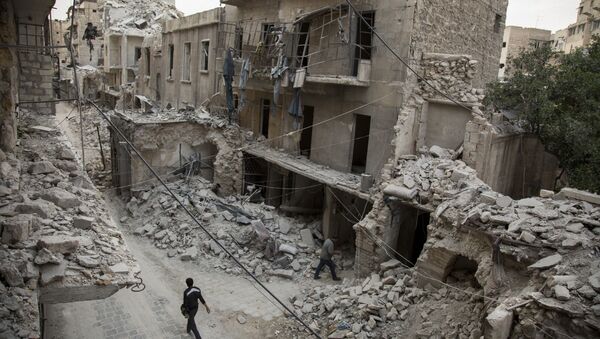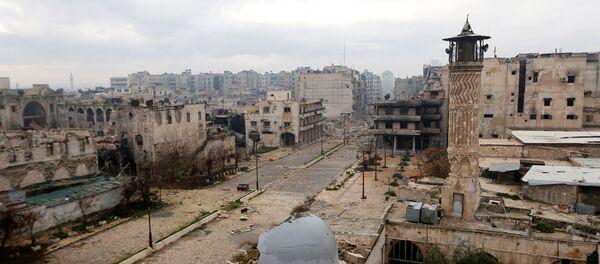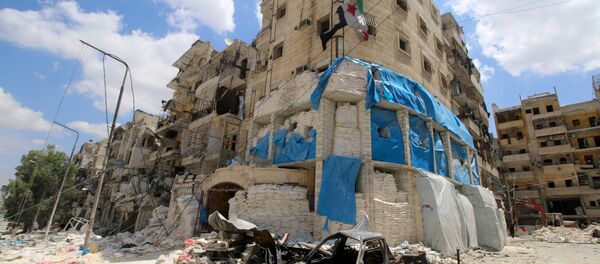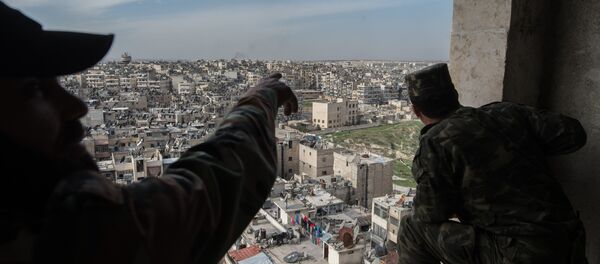At the same time, SANA news agency reported that al-Nusra Front terrorists and their allies made an attempt to breach the ceasefire and fired 20 rockets at the civillian districts of the city on Thursday.
Earlier, the US State Department reported that Moscow and Washington had reached a ceasefire in Aleppo. According to Russian presidential spokesperson Dmitry Peskov, the "ceasefire in Aleppo is fragile because terrorists and opposition fighters are mixed up in the city."
The "silent period" commenced on Thursday at 01:00 a.m. local time. The Syrian Army reported that combat actions would be stopped for 48 hours. In addition, the “silent period” was extended outside Damascus and in to northern Latakia.
Russian Defense Ministry spokesperson Maj. Gen. Igor Konashenkov underscored that the “silent period” in Aleppo could be the first step to end the military conflict in Syria.
However, the situation in Aleppo remains complicated.
According to military correspondent Igor Dmitriev, currently there are over 14,000 militants concentrated around the city, ranging from al-Nusra Front to the Free Syrian Army.
Last week, in a message to Russian leader Vladimir Putin, Syrian President Bashar Assad compared the fight for Aleppo with the battle of Stalingrad.
The battle for the southern Russian city of Stalingrad (now Volgograd) was a turning point in World War II. It was won by the Soviet Army in January 1943.
"Stalingrad is dear to Aleppo and all Syrian cities. Syria vows to continue fighting until the aggressors are defeated and the ultimate victory is ours," Assad wrote in a cable quoted by SANA.
But Aleppo has been compared to Stalingrad before. In February, Spectator wrote that the Syrian Army backed by Russian airstrikes liberated the province just like the Soviet Army liberated Stalingrad in 1942-1943.
"Radical groups have strong positions near Aleppo. They are not ready for a compromise with Assad. Many of them also have foreign sponsors like Turkey and Saudi Arabia. Even if Moscow and Washington has the same positions Ankara and Riyadh would continue to support terrorists," he pointed out.
The analyst added that radical groups in Syria will do everything they can to undermine the ceasefire.
"The war in Syria will end only after on the warring parties are defeated. Since such a situation is impossible the conflict will continue," he concluded.
Alexander Ignatenko, head of the Institute for Religious and Political Studies, noted that the situation in Aleppo is complicated.
"The main problem is the fact that al-Nusra Front terrorists have blocked themselves in Aleppo. There are also fighters of the Free Syrian Army and a number of other radical groups," he said.
Currently, it is impossible to separate the terrorists from other fighters in Aleppo, Igantenko underscored.
"Recently, the US and Russia have been in difficult talks on Aleppo. Moscow even addressed to the UN Security Council to label the Jaysh al-Islam as a terrorist group, but the move was rejected," the analyst said.
At the same time the analyst expressed hope that even a 48-hours ceasefire could improve the situation.
"Taking into account the position of Washington and personally the position of [US State Secretary] John Kerry, chances are high. Recently, Kerry admitted that opposition forces shelled civilians. When terrorists have support in the international arena they become very aggressive. This is why cooperation between Washington and Moscow gives hope for improvement," Ignatenko concluded.





